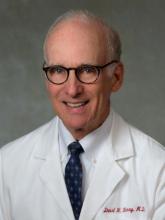David Cella, PhD, of Northwestern University in Chicago, joins Blood & Cancer as the guest host for a conversation with Supriya Mohile, MD, MS, of the University of Rochester in N.Y., on geriatric oncology and the best tools to assess the fitness of older patients with cancer.
In Clinical Correlation, Ilana Yurkiewicz, MD, of Stanford (Calif.) University, talks about social support and what happens when there isn’t a supportive family member at the bedside.
Show notes
- What is “geriatric oncology?”
- The geriatrics population is traditionally defined as people aged 65 years and older.
- Geriatric medicine focuses on patient function and interventions that improve resilience, such as mobility, physical functional status, cognitive function, aging-related issues, and polypharmacy.
- Geriatric oncology integrates these principles into cancer treatment for the elderly.
- Clinical trials tend to exclude older, more frail patients in their study population, making it harder to apply the outcomes of trials to the geriatric population.
- Choosing an appropriate regimen and dose is harder for older patients since toxicity and dosage data are obtained from a more fit population.
- The general rule is to “start low and go slow” for elderly patients.
- In frail patients, oncologists should reconsider treatment altogether because of the implications on functional status.
- Assessment tools for elderly patients
- Geriatric assessment: A validated series of tests based on a survey that assesses categories such as function and quality of life, as well as objective findings, such as cognition and physical performance. It is a better way to determine health status for elderly patients than are the standard ECOG ratings.
- ASCO Guidelines in Geriatric Assessment
- Cancer and Aging Research Group: A community of researchers who are working collaboratively to design and implement clinical trials to improve cancer care in older adults.
Show notes by Ronak Mistry, DO, resident in the department of internal medicine, University of Pennsylvania, Philadelphia.
For more MDedge Podcasts, go to mdedge.com/podcasts
Email the show: podcasts@mdedge.com
Interact with us on Twitter: @MDedgehemonc
Ilana Yurkiewicz on Twitter: @ilanayurkiewicz

